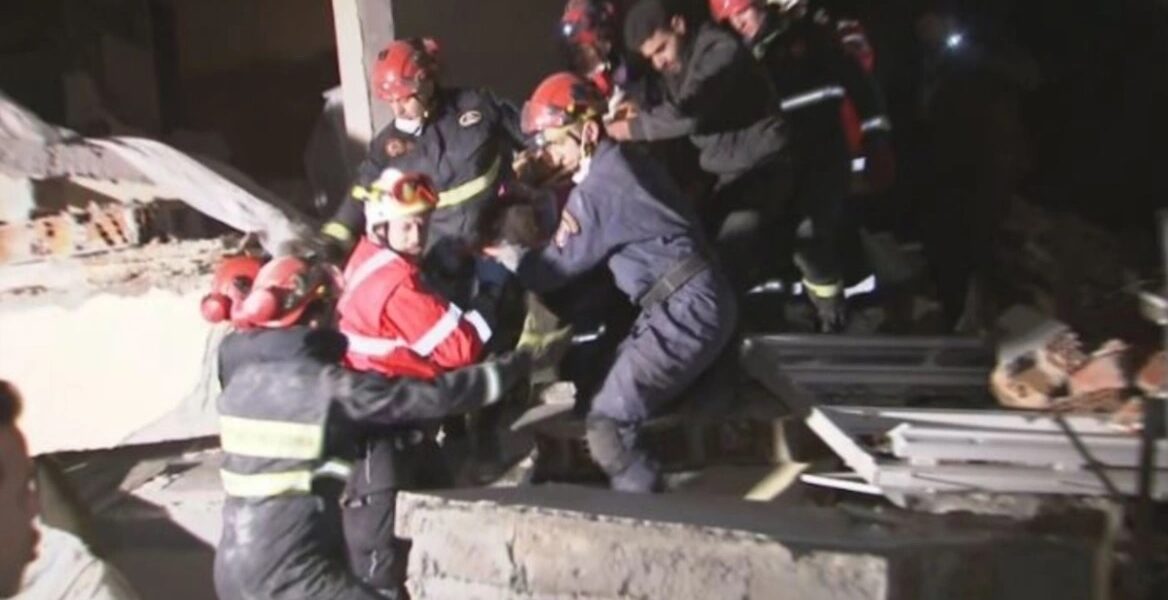The Turkish Consulate in Thessaloniki expressed its gratitude to the Greek Rescue Team in a post on social media, where it stated that the volunteers, in cooperation with Turkish teams, managed to rescue three people from the ruins in the city of Adıyaman.
"The Greek search and rescue team that started from Thessaloniki, rescued three of our citizens from under the ruins in Adıyaman in coordination with the Turkish teams. We are grateful to them," the Consulate pointed out in its post, which is accompanied by a video from the Haberturk TV channel.
Η ελληνική ομάδα έρευνας και διάσωσης ΕΟΔ που ξεκίνησε από τη Θεσσαλονίκη, διέσωσε τρεις πολίτες μας κάτω από τα ερείπια στο Adıyaman σε συντονισμό με τις τουρκικές ομάδες. Τους είμαστε ευγνώμονες 🇬🇷🇹🇷 https://t.co/EdIOcHrvvP
— Türkiye in Thessaloniki (@TC_SelanikBK) February 13, 2023
The Hellenic Rescue Team mission, consisting of 30 trained volunteers from all over Greece, with a search and rescue dog and specialised equipment left Greece's second largest city on February 9 to assist in search and rescue operations in the earthquake-stricken areas of Turkey.
The mission is supported by the Turkish Consulate in Thessaloniki and the Turkish Embassy in Athens.
The death toll from last week’s earthquakes has topped 37,000. Turkish authorities have said that 31,643 people have been killed in the country. According to tallies by the United Nations and the Syrian government, more than 5,814 people have been killed in Syria.
Meanwhile, excavators have begun removing debris from an urban area in Turkey’s hard-hit Hatay province, drone footage showed, as the operation to find survivors started drawing to a close.
Several large hydraulic excavators near the city of Antakya scraped at piles of masonry or knocked down the tops of teetering concrete buildings, footage showed on Monday, with clouds of dust rising from the rubble as slabs of concrete fell.
Workers in high-visibility jackets dotted the desolate expanse of what was once a residential area while a few clusters of onlookers watched from a safe distance.
The opposition Syrian Civil Defence group, known as the White Helmets, are observing a seven-day period of mourning in Syria.
“We will fly flags at half mast, starting today, Feb 13 to mourn the victims of the earthquake in Turkey and Syria,” the group tweeted late on Monday.
The desperate searches for earthquake survivors in Turkey and Syria are entering their final hours, with experts saying the window for rescues has nearly closed given the length of time that has passed and the severity of the building collapses.
Eduardo Reinoso Angulo, a professor at the Institute of Engineering at the National Autonomous University of Mexico, told The Associated Press news agency that the likelihood of finding people alive was “very, very small now”.
David Alexander, a professor of emergency planning and management at University College London, agreed, saying the odds were not very good to begin with. Many of the buildings were so poorly constructed that they collapsed into very small pieces, leaving very few spaces large enough for people to survive in, he told AP.
“If a frame building of some kind goes over, generally speaking we do find open spaces in a heap of rubble where we can tunnel in,“ Alexander said. “Looking at some of these photographs from Turkey and from Syria, there just aren’t the spaces.”
Winter conditions have also reduced the window for survival.
In the cold, the body shivers to keep warm, but that burns a lot of calories, meaning that people also deprived of food will die more quickly, said Dr Stephanie Lareau, a professor of emergency medicine at Virginia Tech in the United States.
UN Secretary-General Antonio Guterres has welcomed al-Assad’s decision to open the two crossing points of Bab al-Salam and Al Ra’ee to allow for the delivery of humanitarian aid from Turkey to rebel-held parts of northwest Syria.
“As the toll of the 6 February earthquake continues to mount, delivering food, health, nutrition, protection, shelter, winter supplies and other life-saving supplies to all the millions of people affected is of the utmost urgency,” Guterres said in a statement.
“Opening these crossing points — along with facilitating humanitarian access, accelerating visa approvals and easing travel between hubs — will allow more aid to go in, faster,” he added.
Currently, the UN has only been allowed to deliver aid to the northwest Idlib area through a single crossing at Bab al-Hawa, at Syrian ally Russia’s insistence.
READ MORE: Turkey Earthquake: The moment Emine Erdoğan realises she was comforting a dwarf instead of a child.

